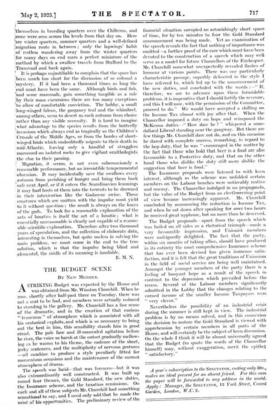THE BUDGET SCENE
BY NEW MEMBER.
ASTRIKING Budget was expected by the House and was obtained from Mr. Winston Churchill. When he rose, shortly after half-past three on Tuesday, there was not a seat to be had, and members were actually reduced to standing in the gallery. Mr. Churchill has a fine sense of the dramatic, and in the creation of that curious " tenseness " of atmosphere which is associated with all his oratorical exploits, and which is so necessary to bring out the best in him, this sensibility stands him in good stead. The pale face and ill-concealed agitation before he rises, the voice so harsh at the outset gradually mellow- ing as he warms to his theme, the cadence of the short, jerky sentences, and the multiplicity of nervous gestures —all combine to produce a style peculiarly fitted for momentous occasions and the maintenance of the correct atmosphere of drama. The speech was lucid—that was foreseen—but it was also extraordinarily well constructed. It was built up round four themes, the Gold Standard, the new duties, the Insurance scheme, and the taxation remissions. On each and all of these subjects Mr. Churchill had something sensational to say, and I need only add that he made-the racist of his opportunities. The preliminary review of the financial situation occupied an astonishingly short space of time, for by ten minutes to four the Gold Standard announcement was being made. Yet an examination of the speech reveals the fact that nothing of importance was omitted—a further proof of the care which must have been devoted to the construction of a speech which may well serve as a model for future Chancellors of the Exchequer. Mr. Churchill somewhat unexpectedly revealed flashes of humour at various points. There was one particularly characteristic passage, superbly delivered in the style I have referred to, which led up to the announcement of the new duties, and concluded with the words :—" If, therefore, we are to advance upon these formidable problems, it is imperative that I should fortify the revenue, and this I will now, with the permission of the Committee, proceed to do." We would have accepted a shilling on the Income Tax almost with joy after that. When the Chancellor imposed a duty on hops and reimposed the McKenna duties—" How dare he ? " whispered a scan- dalized Liberal standing near the gangway. But there are few things Mr. Churchill dare not do, and on this occasion he dared with complete success, remarking, in regard to the hop duty, that he was " encouraged in the matter by the fact that those who hold that beer is a food arc also favourable to a Protective duty, and that on the other hand those who dislike the duty still more dislike the suggestion that beer is food."
The Insurance proposals were listened to with keen interest, although as the scheme was unfolded certain members on the Labour benches were noticeably restive and uneasy. The Chancellor indulged in no propaganda, but the value of the Budget from an electioneering point of view became increasingly apparent. Mr. Churchill concluded by announcing the reduction in Income Tax, and when he sat down after speaking for over two hours he received great applause, but no more than he deserved.
The Budget proposals—apart from the speech which was hailed on all sides as a rhetorical triumph—made a very favourable impression, and Unionist members were unfeignedly delighted. The fact that the party, within six months of taking office, should have produced in its entirety the most comprehensive Insurance scheme that has ever been devised has given immense satis- faction, and it is felt that the great traditions of Unionism in the field of social service are being well maintained. Amongst the younger members of the party there is a feeling of buoyant hope as a result of the speech in contrast to the depression which prevailed before the recess. Several of the Labour members significantly admitted in the Lobby that the changes relating to the earned income of the smaller Income Taxpayers were " very clever."
Nevertheless the possibility of an industrial crisis during the summer is still kept in view. The industrial problem is by no means solved, and in this connexion the decision to restore the Gold Standard is viewed with apprehension by certain members in all parts of the House, and will certainly be the subject of keen discussion.
On the whole I think it will be almost universally agreed that the Budget (to quote the words of the Chancellor himself) may, without exaggeration, merit the epithet " satisfactory."










































 Previous page
Previous page